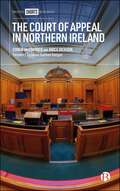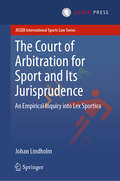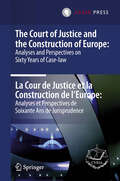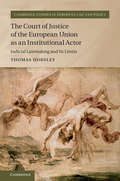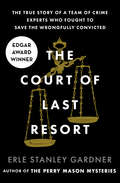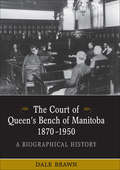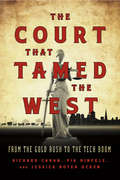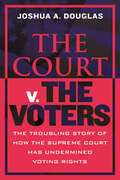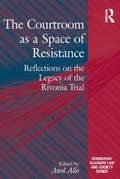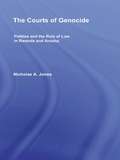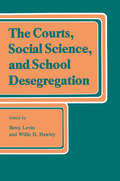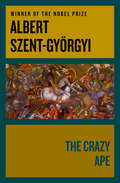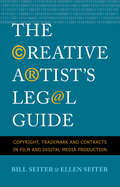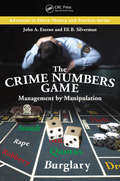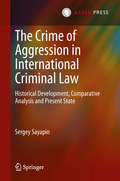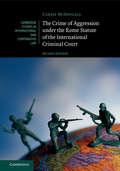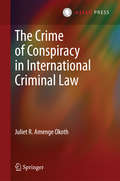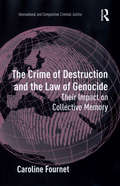- Table View
- List View
The Court of Appeal in Northern Ireland
by Brice Dickson Conor McCormickAvailable open access digitally under CC-BY-NC-ND licence. The Court of Appeal in Northern Ireland has functioned without interruption for over a century, yet its intermediate position can obscure the importance of its judgments. This book demonstrates the Court of Appeal’s pivotal role in securing justice, both by correcting lower court decisions and by developing the common law. It examines, in particular, how the Court has applied and developed the rule of law in a post-conflict society. Authored by experts in the law of Northern Ireland, this compelling text is based on archival research, statistical and qualitative case analyses, court observations, and exclusive interviews with senior judges.
The Court of Arbitration for Sport and Its Jurisprudence: An Empirical Inquiry into Lex Sportiva (ASSER International Sports Law Series)
by Johan LindholmThis book takes a close look at the Court of Arbitration for Sport (CAS), challenging existing claims and answering previously unanswered questions, by considering all of its publicly available decisions, both in its entirety as a body of jurisprudence and on a case-by-case level.It also investigates the actors involved in adjudication before the CAS, both the parties that bring disputes before the CAS and the arbitrators that resolve them, and in so doing establish precedents that govern sports generally.While the book relies upon and includes more traditional legal theory and analysis, it combines this with an empirical analysis of a large portion of the CAS's decisions. Hereby it relies upon and relates to the theory of the development of a transnational legal order in sports, the lex sportiva.The publication is targeted at and will benefit those professionally working in or interested in the fields of sports law, arbitration law, transnational law, or empirical legal studies.Johan Lindholm is a Professor of Law at Umeå University in Sweden.
The Court of Justice and the Construction of Europe: Analyses and Perspectives on Sixty Years of Case-law - La Cour de Justice et la Construction de l'Europe: Analyses et Perspectives de Soixante Ans de Jurisprudence
by E. Levits A. Rosas Y. Bot Court of Justice of the European UnionThis book is a contributed volume published by the Court of Justice of the European Union on the occasion of its 60th anniversary. It provides an insight to the 60 years of case-law of the Court of Justice and its role in the progress of European Integration. The book includes contributions from eminent jurists from almost all the EU Member States. All the main areas of European Union are covered in a systematic way. The contributions are regrouped in four chapters dedicated respectively to the role of the Court of Justice and the Judicial Architecture of the European Union, the Constitutional Order of the European Union, the Area of EU Citizens and the European Union in the World. The topics covered remain of interest for several years to come. This unique book, a "must-have" reference work for Judges and Courts of all EU Members States and candidate countries, and academics and legal professionals who are active in the field of EU law, is also valuable for Law Libraries and Law Schools in Europe, the United States of America, Latin America, Asia and Africa and law students who focus their research and studies in EU law.
The Court of Justice of the European Union as an Institutional Actor: Judicial Lawmaking and its Limits (Cambridge Studies in European Law and Policy)
by Thomas HorsleyThe EU Treaties bind the Court of Justice of the European Union as an institution of the Union. But what does that mean for judicial lawmaking within the EU legal order? And how might any limits set out in the EU Treaties be effectively applied to the Court of Justice as lawmaker? This book interrogates these fundamental and underexplored questions at a critical juncture in European integration. It argues that the EU Treaties should be considered to function as the principal touchstones for assessing the internal constitutionality, and hence legitimacy, of all Union institutional activity - including the work of the Court. It then examines how far the Court of Justice complies with the EU Treaty framework in the exercise of its interpretative functions. The results of that analysis are striking and offer scholars powerful new insights into the nature and limits of the Court's role within the EU legal order.
The Court of Last Resort: The True Story of a Team of Crime Experts Who Fought to Save the Wrongfully Convicted
by Erle Stanley GardnerEdgar Award Winner: True stories of miscarriages of justice, legal battles, and landmark reversals, by the creator of Perry Mason. In 1945, Erle Stanley Gardner, noted attorney and author of the popular Perry Mason mysteries, was contacted by an overwhelmed California public defender who believed his doomed client was innocent. William Marvin Lindley had been convicted of the rape and murder of a young girl along the banks of the Yuba River, and was awaiting execution at San Quentin. After reviewing the case, Gardner agreed to help—it seemed the fate of the &“Red-Headed Killer&” hinged on the testimony of a colorblind witness. Gardner&’s intervention sparked the Court of Last Resort. The Innocence Project of its day, this ambitious and ultimately successful undertaking was devoted to investigating, reviewing, and reversing wrongful convictions owing to poor legal representation, prosecutorial abuses, biased police activity, bench corruption, unreliable witnesses, and careless forensic-evidence testimony. The crimes: rape, murder, kidnapping, and manslaughter. The prisoners: underprivileged and vulnerable men wrongly convicted and condemned to life sentences or death row with only one hope—the devotion of Erle Stanley Gardner and the Court of Last Resort. Featuring Gardner&’s most damning cases of injustice from across the country, The Court of Last Resort won the Edgar Award for Best Fact Crime. Originating as a monthly column in Argosy magazine, it was produced as a dramatized court TV show for NBC.
The Court of Queen's Bench of Manitoba, 1870-1950
by Dale BrawnThis study of the Manitoba judiciary is not only the first biographical history to examine an entire provincial bench, it is also one of the first studies to offer an internal view of the political nature of the judicial appointment process. Dale Brawn has penned the biographies of the first thirty-three men appointed to Manitoba's Court of Queen's Bench. The relative youth of Manitoba as a province and the small size of its legal profession makes possible an exceptionally detailed investigation of the background of those appointed to the province's highest trial court.The biographical data that Brawn has collected for this book highlights the extent to which judicial candidates underwent a socialization process designed to produce a legal elite whose members shared remarkably similar views and ways of thinking. In addition, these biographies suggest that until at least 1950, seats on provincial benches were rewards for political services rendered. Many lawyers became judges not because of their legal ability, but because they had made themselves known in the communities in which they practiced. This fascinating study offers an intimate look at personalities ranging from prime ministers to members of the bench and both senior levels of government.
The Court that Tamed the West: From the Gold Rush to the Tech Boom
by Richard Cahan Pia Hinckle Jessica OckenFrom the gold rush to the Internet boom, the US District Court for the Northern District of California has played a major role in how business is done and life is lived on the Pacific Coast. When California was first admitted to the Union, pioneers were busy prospecting for new fortunes, building towns and cities—and suing each other. San Francisco became the epicenter of a litigious new world being cobbled together from gold dust and sand dunes. Its federal court set precedents, from deciding the fate of Mexican land grants and shanghaied sailors to civil rights for Chinese immigrants. Through the era of Prohibition and the labor movement to World War II and the tumultuous sixties and seventies, the court's historic rulings have defined the Bay Area's geography, culture, and commerce. Sponsored by the Northern District Court's Historical Society and told by veteran journalists, The Court That Tamed the West presents the region's history through a new lens, offering insight along with great storytelling.
The Court v. The Voters: The Troubling Story of How the Supreme Court Has Undermined Voting Rights
by Joshua A. DouglasAn urgent and gripping look at the erosion of voting rights and its implications for democracy, told through the stories of 9 Supreme Court decisions—and the next looming case In The Court v. The Voters, law professor Joshua Douglas takes us behind the scenes of significant cases in voting rights—some surprising and unknown, some familiar—to investigate the historic crossroads that have irrevocably changed our elections and the nation. In crisp and accessible prose, Douglas tells the story of each case, sheds light on the intractable election problems we face as a result, and highlights the unique role the highest court has played in producing a broken electoral system. Douglas charts infamous cases like: Bush v. Gore, which opened the door to many election law claimsCitizens United, which contributed to skewed representation—but perhaps not in the way you might thinkShelby County v. Holder, which gutted the vital protections of the Voting Rights ActCrawford v. Marion County Elections Board, which allowed states to enforce voter ID laws and make it harder for people to vote The Court v. The Voters powerfully reminds us of the tangible, real-world effects from the Court&’s voting rights decisions. While we can—and should—lament the democracy that might have been, Douglas argues that we can—and should—double down in our efforts to protect the right to vote.
The Court vs. Congress: Prayer, Busing, and Abortion
by Edward Keynes Randall K. MillerSince the early 1960s the Supreme Court and its congressional critics have been locked in a continuing dispute over the issues of school prayer, busing, and abortion. Although for years the Court's congressional foes have introduced legislation designed to curb the powers of the federal courts in these areas, they have until now failed to enact such proposals. It is likely that these legislative efforts and the present confrontation with the Court will continue.Edward Keynes and Randall Miller argue that Congress lacks the constitutional power to legislate away the powers of the federal courts and to prevent individuals from seeking redress for presumed infringements of their constitutional rights in these areas. They demonstrate that neither the framers nor ratifiers of the Constitution intended the Congress to exercise plenary power over the appellate jurisdiction of the Supreme Court. Throughout its history the Court has never conceded unlimited powers to Congress; and until the late 1950s Congress had not attempted to gerrymander the Court's jurisdiction in response to specific decisions. But the authors contend this is just what the sponsors of recent legislative attacks on the Court intend, and they see such efforts as threatening the Court's independence and authority as defined in the separation of powers clauses of the Constitution.
The Courtroom as a Space of Resistance: Reflections on the Legacy of the Rivonia Trial (Critical Studies in Jurisprudence)
by Awol AlloFifty years before his death in 2013, Nelson Mandela stood before Justice de Wet in Pretoria's Palace of Justice and delivered one of the most spectacular and liberating statements ever made from a dock. In what came to be regarded as "the trial that changed South Africa", Mandela summed up the spirit of the liberation struggle and the moral basis for the post-Apartheid society. In this blistering critique of Apartheid and its perversion of justice, Mandela transforms the law into a sword and shield. He invokes it while undermining it, uses it while subverting it, and claims it while defeating it. Wise and strategic, Mandela skilfully reimagines the courtroom as a site of visibility and hearing, opening up a political space within the legal. This volume returns to the Rivonia courtroom to engage with Mandela's masterful performance of resistance and the dramatic core of that transformative event. Cutting across a wide-range of critical theories and discourses, contributors reflect on the personal, spatial, temporal, performative, and literary dimensions of that constitutive event. By redefining the spaces, institutions and discourses of law, contributors present a fresh perspective that re-sets the margins of what can be thought and said in the courtroom.
The Courts of Genocide: Politics and the Rule of Law in Rwanda and Arusha
by Nicholas JonesThe Courts of Genocide focuses on the judicial response to the genocide in Rwanda in order to address the search for justice following mass atrocities. The central concern of the book is how the politics of justice can get in the way of its administration. Considering both the ICTR (International Criminal tribunal for Rwanda), and all of the politics surrounding its work, and the Rwandan approach (the Gacaca courts and the national judiciary) and the politics that surround it, The Courts of Genocide addresses the relationship between these three 'courts' which, whilst oriented by similar concerns, stand in stark opposition to each other. In this respect, the book addresses a series of questions, including: What aspects of the Rwandan genocide itself played a role in directing the judicial response that has been adopted? On what basis did the government of Rwanda decide to address the genocide in a legalistic manner? Around what goals has each judicial response been organized? What are the specific procedures and processes of this response? And, finally, what challenges does its multifaceted character create for those involved in its operation, well as for Rwandan society? Addressing conceptual issues of restorative and retributive justice, liberal legalism and cosmopolitan law, The Courts of Genocide constitutes a substantially grounded reflection upon the problem of 'doing justice' after genocide.
The Courts, Social Science, and School Desegregation
by Besty Levin and Willis D. HawleyFirst Published in 2018. Routledge is an imprint of Taylor & Francis, an Informa company.
The Courts, the Charter, and the Schools
by Michael Manley-Casimir Kristen Manley-CasimirThe adoption of the Canadian Constitution Act in 1982, with its embedded Charter of Rights and Freedoms, ushered in an era of unprecedented judicial influence on Canada's public policy. The Courts, the Charter, and the Schools examines how the Constitution Act has affected educational policy during the first twenty-five years of the Charter by analyzing landmark rulings handed down from appellate courts and the Supreme Court.The contributors consider the influence that Charter cases have had on educational policies and practices by discussing cases involving fundamental freedoms, legal rights, equality rights, and minority language rights. Demonstrating why and how the Charter was invoked, interpreted, and applied in each of these cases, this volume also highlights the resulting consequences for Canada's public schools. An illuminating collection of essays by prominent legal scholars and educational commentators, The Courts, the Charter, and the Schools is a significant contribution to the study of educational law and policy in Canada.
The Covid-19 Pandemic and Global Bioethics (Advancing Global Bioethics #18)
by Henk ten HaveThis book demonstrates that the COVID 19 pandemic asks for a a global approach to bioethics. it describes how the pandemic affects the experience of being in a world that is intrinsically characterized by global connectivity. It demonstrates that a moral vision is necessary to articulate this experience of connectedness. Subsequently, a perspective of global bioethics is introduced, which provides a broader framework than mainstream bioethics, since it highlights the significance of both vulnerability and solidarity. Through a unique global perspective the book addresses the moral challenges of the pandemic, and places the confrontation with death, disease and disability within a wider framework of ethical concerns. This book is of important in the public debate on infectious diseases, and of relevance to health professionals, global health educators, public health experts,as well as policy makers.
The Coyotes of Carthage: A Novel
by Steven Wright“With this splendid debut, Steven Wright announces his arrival as a major new voice in the world of political thrillers. I enjoyed it immensely.” —John GrishamA blistering and thrilling debut—a biting exploration of American politics, set in a small South Carolina town, about a political operative running a dark money campaign for his corporate clientsDre Ross has one more shot. Despite being a successful political consultant, his aggressive tactics have put him on thin ice with his boss, Mrs. Fitz, who plucked him from juvenile incarceration and mentored his career. She exiles him to the backwoods of South Carolina with $250,000 of dark money to introduce a ballot initiative on behalf of a mining company. The goal: to manipulate the locals into voting to sell their pristine public land to the highest bidder.Dre arrives in God-fearing, flag-waving Carthage County, with only Mrs. Fitz’s well-meaning yet naïve grandson Brendan as his team. Dre, an African-American outsider, can’t be the one to collect the signatures needed to get on the ballot. So he hires a blue-collar couple, Tyler Lee and his pious wife, Chalene, to act as the initiative’s public face.Under Dre’s cynical direction, a land grab is disguised as a righteous fight for faith and liberty. As lines are crossed and lives ruined, Dre’s increasingly cutthroat campaign threatens the very soul of Carthage County and perhaps the last remnants of his own humanity.A piercing portrait of our fragile democracy and one man’s unraveling, The Coyotes of Carthage paints a disturbingly real portrait of the American experiment in action.
The Crazy Ape: Written by a Biologist for the Young
by Albert Szent-GyörgyiA Nobel Prize winner, Dr. Szent-Györgyi concerns himself with the underlying forces and conditions that have prevented the realization of the higher possibilities of the American Dream, and, by extension, of all mankind. He addresses himself especially to the youth of the world in his attempt to show how man, the more he progresses technologically, seems the more to regress psychologically and socially, until he resembles his primate ancestors in a state of high schizophrenia. The fundamental question asked by this book is: why is it that most of the scientific research that is done to elevate human life serves in the end to destroy it? That this phenomenon exists is unarguable. How to alter it is the problem the author tackles. He finds the possibility, indeed the instrument of our survival, in our youth. Dr. Szent-Györgyi calls upon the youth the world over to organize and exercise their power to create a new world. He implores them not to waste their energies in petulance and frustration—the world is ripe for the radical changes needed for man&’s survival, and for youth to fritter away their opportunity would be to compound the tragedy and seal the fate of mankind.
The Crazy Ape: Written by a Biologist for the Young
by Albert Szent-GyörgyiA Nobel Prize winner, Dr. Szent-Györgyi concerns himself with the underlying forces and conditions that have prevented the realization of the higher possibilities of the American Dream, and, by extension, of all mankind. He addresses himself especially to the youth of the world in his attempt to show how man, the more he progresses technologically, seems the more to regress psychologically and socially, until he resembles his primate ancestors in a state of high schizophrenia. The fundamental question asked by this book is: why is it that most of the scientific research that is done to elevate human life serves in the end to destroy it? That this phenomenon exists is unarguable. How to alter it is the problem the author tackles. He finds the possibility, indeed the instrument of our survival, in our youth. Dr. Szent-Györgyi calls upon the youth the world over to organize and exercise their power to create a new world. He implores them not to waste their energies in petulance and frustration—the world is ripe for the radical changes needed for man&’s survival, and for youth to fritter away their opportunity would be to compound the tragedy and seal the fate of mankind.
The Creative Artist's Legal Guide
by Bill Seiter Ellen SeiterIn today's complex media environment, aspiring filmmakers and new media artists are as vulnerable as swimmers in shark-infested waters. This user-friendly guide supplies creative artists with the essential legal concepts needed to swim safely with lawyers, agents, executives, and other experts in intellectual property and business law. How do I copyright my screenplay? How can I clear rights for my film project? What can I do to avoid legal trouble when I produce my mockumentary? How do I ascertain whether a vintage novel is in the public domain? Is the trademark I've invented for my production company available? What about copyright and trademark rights overseas? If I upload my film to YouTube, do I give up any rights? Bill Seiter and Ellen Seiter answer these questions and countless others while also demystifying the fundamental principles of intellectual property. Clear and thorough, this plain-spoken and practical guide is essential for anyone seeking to navigate the rapidly changing media environment of today.
The Crime Numbers Game: Management by Manipulation
by John A. Eterno Eli B. SilvermanIn the mid-1990s, the NYPD created a performance management strategy known as Compstat. It consisted of computerized data, crime analysis, and advanced crime mapping coupled with middle management accountability and crime strategy meetings with high-ranking decision makers. While initially credited with a dramatic reduction in crime, questions quic
The Crime of Aggression in International Criminal Law
by Sergey SayapinSince after the Second World War, the crime of aggression is - along with genocide, crimes against humanity and war crimes - a "core crime" under international law. However, despite a formal recognition of aggression as a matter of international criminal law and the reinforcement of the international legal regulation of the use of force by States, numerous international armed conflicts occurred but no one was ever prosecuted for aggression since 1949. This book comprehensively analyses the historical development of the criminalisation of aggression, scrutinises in a detailed manner the relevant jurisprudence of the Nuremberg and Tokyo Tribunals as well as of the Nuremberg follow-up trials, and makes proposals for a more successful prosecution for aggression in the future. In identifying customary international law on the subject, the volume draws upon a wealth of applicable sources of national criminal law and puts forward a useful classification of States´ legislative approaches towards the criminalisation of aggression at the national level. It also offers a detailed analysis of the current international legal regulation of the use of force and of the Rome Statute´s substantive and procedural provisions pertaining to the exercise of the International Criminal Court´s jurisdiction with respect to the crime of aggression, after 1 January 2017.
The Crime of Aggression under the Rome Statute of the International Criminal Court
by Carrie McdougallThis guide to the crime of aggression provisions under the Rome Statute of the International Criminal Court (ICC) offers an exhaustive and sophisticated legal analysis of the crime's definition, as well as the jurisdictional provisions governing the ICC's exercise of jurisdiction over the crime. A range of practical issues likely to arise in prosecutions of the crime of aggression before the ICC are canvassed, as is the issue of the domestic prosecution of the crime. It also offers an insight into the geopolitical significance of the crime of aggression and the activation of the ICC's ability to exercise its jurisdiction over the crime. The author's intimate involvement in the crime's negotiations, combined with extensive scholarly reflection on the criminalisation of inter-State uses of armed force, makes this highly relevant to all academics and practitioners interested in the crime of aggression.
The Crime of Aggression under the Rome Statute of the International Criminal Court (Cambridge Studies in International and Comparative Law)
by Carrie McDougallAfter the crime of aggression was adopted under the Rome Statute of the International Criminal Court, Carrie McDougall used her intimate involvement in the crime's negotiations, combined with extensive scholarly reflection to produce the first and most comprehensive academic study. This updated second edition offers an exhaustive and sophisticated legal analysis of the crime's definition, as well as the provisions governing the ICC's exercise of jurisdiction over the crime. It explores the desirability of holding individuals to account for unlawful uses of inter-State armed force, the geo-political significance of the crime and a range of practical issues likely to arise in prosecutions before both the ICC and domestic courts. This book is highly relevant to all academics and practitioners interested in the crime of aggression, as well as broader issues relating to the prohibition of the use of force, international criminal law and the ICC.
The Crime of Aggression: The Quest for Justice in an Age of Drones, Cyberattacks, Insurgents, and Autocrats (Human Rights and Crimes against Humanity #36)
by Noah WeisbordA gripping behind-the-scenes account of the dramatic legal fight to hold leaders personally responsible for aggressive warOn July 17, 2018, starting an unjust war became a prosecutable international crime alongside genocide, crimes against humanity, and war crimes. Instead of collective state responsibility, our leaders are now personally subject to indictment for crimes of aggression, from invasions and preemptions to drone strikes and cyberattacks. The Crime of Aggression is Noah Weisbord’s riveting insider’s account of the high-stakes legal fight to enact this historic legislation and hold politicians accountable for the wars they start.Weisbord, a key drafter of the law for the International Criminal Court, takes readers behind the scenes of one of the most consequential legal dramas in modern international diplomacy. Drawing on in-depth interviews and his own invaluable insights, he sheds critical light on the motivations of the prosecutors, diplomats, and military strategists who championed the fledgling prohibition on unjust war—and those who tried to sink it. He untangles the complex history behind the measure, tracing how the crime of aggression was born at the Nuremberg trials only to fall dormant during the Cold War, and he draws lessons from such pivotal events as the collapse of the League of Nations, the rise of the United Nations, September 11, and the war on terror.The power to try leaders for unjust war holds untold promise for the international order, but also great risk. In this incisive and vitally important book, Weisbord explains how judges in such cases can balance the imperatives of justice and peace, and how the fair prosecution of aggression can humanize modern statecraft.
The Crime of Conspiracy in International Criminal Law
by Juliet R. Amenge OkothThis book looks at the relevance of conspiracy in international criminal law. It establishes that conspiracy was introduced into international criminal law for purposes of prevention and to combat the collective nature of participation in commission of international crimes. Its use as a tool of accountability has, however, been affected by conflicting conceptual perceptions of conspiracy from common law and civil law countries. This conflict is displayed in the decisions on conspiracy by the international criminal tribunals, and finally culminates into the exclusion of punishment of conspiracy in the Rome Statute. It is questionable whether this latest development on the law of conspiracy was a prudent decision. While the function of conspiracy as a mode of liability is satisfactorily covered by the modes of participation in the Rome Statute, its function as a purely inchoate crime used to punish incomplete crimes is missing. This book creates a case for inclusion in the Rome Statute, punishment of conspiracies involving international crimes that do not extend beyond the conceptual stage, to reinforce the Statute's purpose of prevention. The conspiracy concept proposed is one that reflects the characteristics acceptable under both common law and civil law systems.
The Crime of Destruction and the Law of Genocide: Their Impact on Collective Memory (International and Comparative Criminal Justice)
by Caroline FournetThis highly original work provides a thought-provoking and valuable resource for researchers and academics with an interest in genocide, criminology, international organizations, and law and society. In her book, Caroline Fournet examines the law relating to genocide and explores the apparent failure of society to provide an adequate response to incidences of mass atrocity. The work casts a legal perspective on this social phenomenon to show that genocide fails to be appropriately remembered due to inherent defects in the law of genocide itself. The book thus connects the social response to the legal theory and practice, and trials in particular. Fournet's study illustrates the shortcomings of the Genocide Convention as a means of preventing and punishing genocide as well as its consequent failure to ensure the memory of this heinous crime.
